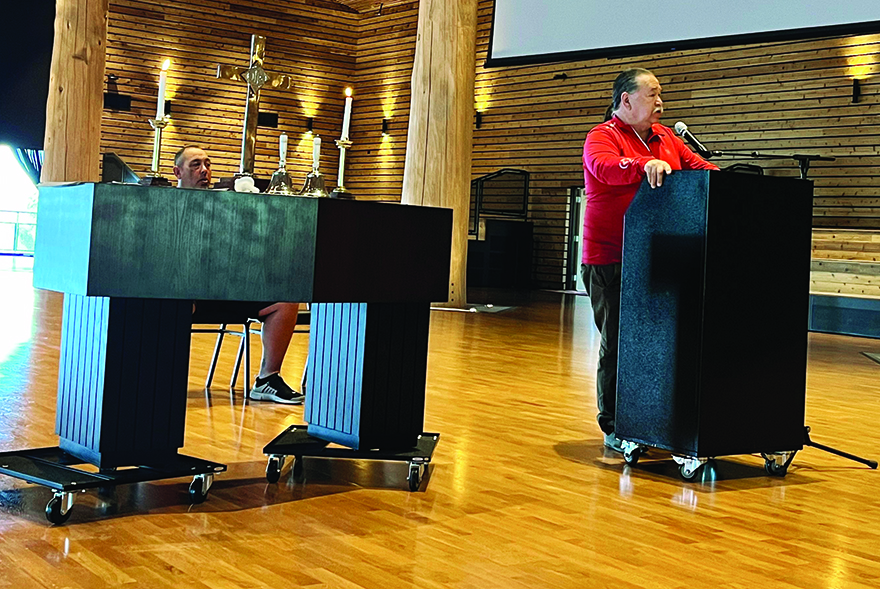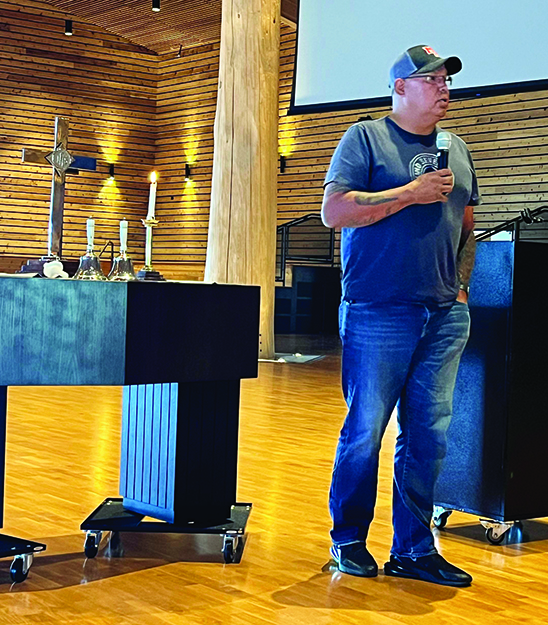
By Shaelyn Smead, Tulalip News
Following a community burning, on September 18, Tulalip held a community prayer gathering in attempts to help heal the tremendous amount of loss that our tribe has seen and felt over the years. The hearts and souls of our people have suffered for centuries, and unfortunately as time goes on, the amount of fatalities doesn’t seem to have an end in sight.
The community prayer was held within the Gathering Hall, where tribal members could share a meal, gather, see the works of our spiritual leaders, hear from community leaders, and share their personal feelings and experiences of grief. The afternoon consisted of a blessing, an interfaith service, and spiritual practices for tribal members to participate in. The hall was filled with emotion as tribal members expressed their feelings, the loss of their loved ones, and the future of the community.
Between the community burning and the community prayer, spiritual leaders from Tulalip traveled across the reservation to different buildings and areas that tribal members frequent. The purpose of this was to help bless and release some of the negative energy that seems to carry through these areas. Several spiritual leaders that were in attendance spoke of the tragedies that they felt. They spoke of the pain and losses that our community has endured and ultimately how exhaustive the blessings were because of it.
Tribal elder Ray Fryberg spoke on this issue saying, “These buildings needed to be taken care of. If we don’t seek spiritual guidance, a lot of this grief and residue from mourning falls onto the floor, and seeps into the walls. If we don’t clean it up, then that same grief and residue will cling to other people walking through it. When this event was started, our ancestors heard it, and they came. They are here in the spiritual bleachers around us, and they are thankful for the work being done.”
Tribal members in attendance spoke about the community prayer as something that has been long overdue. After witnessing the tremendous number of deaths in the community, Chairwoman Teri Gobin spearheaded the event to help address this issue. Currently within Tulalip Tribes, Community Health has calculated an average of 50 deaths per year. Unfortunately, the leading cause for deaths within tribal territories most often relate to drugs and alcohol. Looking at statistics such as this, some would consider it an epidemic.
Experiencing such levels of grief, you have to wonder the psychological and spiritual effects it can have on a community. For some tribal members, it’s as if it’s a never ending cycle, going from one death to another. For others, it’s a pain so intolerable, that they lost their way of life. And just like any disease, grief spreads.
Tribal member Antonia Ramos spoke about grief and how it’s important to acknowledge our emotions, “I remember going through a hard time in a my life and someone spoke to me and said ‘Why are you so afraid to cry? Who told you that you cannot cry?’ And I remember thinking I don’t think anyone has ever told me that, I just know that I couldn’t. And the woman looked at me and said ‘If mother earth never got rain, she’d never have trees, the flowers would never bloom, and the animals could never drink. So why are you denying your body the opportunity to cleanse?’ and it stuck with me. Now that I’m home and I see all of our beautiful people, I also see the pain that they carry and I wonder, who told us we couldn’t feel or that we couldn’t cry? And I pray for us.”
Grief can be such a paralyzing feeling and it often takes a long time for someone to finally feel any level of normalcy after a loss. But the path to normalcy begins with acknowledging those feelings. Generational trauma is carried on through grief. Trauma may initially act as a match, what keeps the fire going in the unresolved pain. As Indigenous people, we have learned through residential boarding schools, colonialism, addiction, etc., just how detrimental generational trauma can be. A loss is a loss no matter what era we live in. And if the pain we feel is not taken care of in this generation, then it certainly will be passed onto the next. So where does generational trauma finally stop?

Though there are numerous resources that people can utilize, many natives would argue that healing comes through connecting with your culture, listening to your elders and spiritual leaders, speaking about your grief, and simply showing up.
Tribal member Marlin Fryberg spoke openly about his frustrations within the community and the lack of presence at the event, “Where is our community today? Where are all the young people that are supposed to be taking over for our elders one day? There is a problem in our community that we have to talk about and there’s a whole tribe out there that isn’t here. Unfortunately we live such fast lives, and everyone has an opinion, but no one wants to listen. When I speak with our elders about how we can help our people spiritually, it starts with listening. And it takes all of us to understand how to do that.”
Many tribal members in attendance nodded in agreement, appreciating all the work that our elders and spiritual leaders have done for our community and the precedence that they set for our people. This standard of cultural and spiritual living was frequently discussed during the event, and a feeling of urgency overwhelmed the hall.
Council member Hazen Shopbell spoke candidly by saying, “The generations before us took on so many burdens and they held strong. They put in the work and fought for us. We are who we are and have what we have because of what they did. We are here because of them, and we have to put in that same work for the next generation. Keep sweating, keep singing, keep dancing. What our spiritual leaders are doing is not easy. They put in their time and effort, and we are so grateful them, but we have to keep moving and do our part too.”
Even though the process to bless such large areas and in such quantities can be an exhausting practice for our spiritual leaders, they agreed with some of our tribal leaders in that these events are something that should be held more often. Giving more opportunities for the community to cleanse, and so that our people aren’t holding onto this pain for as long as they have.
For future community burning and prayers, please watch out for any government announcements. If you or someone you know is overwhelmed with the grief you feel, please call the Community Health nurse team at 3607165662 and ask about the Support Circle.